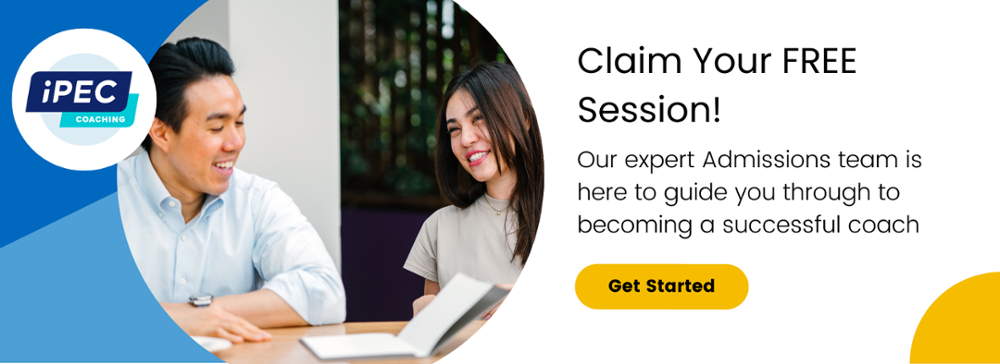How to Become an Executive Coach: 3 Questions to Ask Yourself Before Jumping In
by Grace Germond
Feb 15, 2019 | 6 minutes read
It’s an exciting move. Everyone’s telling you that you’d be an amazing coach, and you’ve always wanted to run your own business.
This is a great moment to slow down, take a breath, take a beat and take some time to think about whether you’re ready to jump into the world of Executive Coaching.
The idea of achieving great potential as an Executive Coach can be alluring and inspiring, but there’s certainly more to consider before diving headlong into the deep end. Consider asking yourself these three revealing questions to make a more confident decision about whether becoming an Executive Coach is right for you.
Question #1: What are my goals?
That’s right: the G-word. That big, hairy, audacious one that begs to know what you’re seeking to accomplish. The idea of making a leap into something new can be scary when you’re just beginning to feel things out, but if you can start with personally defined goals, it’ll bring the whole process into much clearer perspective.
Because, unlike the reality in many traditional corporate roles, you can create just about any future you imagine. Your coaching career can be whatever you make of it. Instead of trying to reach some ominous, intangible objective–like “be a successful coach and leadership builder”–break it down into smaller parts. We like starting with a simple why...
Why do I want to be a coach?
Simon Sinek popularized the concept of owning your why when he published his book Start with Why. Your why is your north star. Being an Executive Coach is not just a job, but rather a way to live out your own vision.
You’re going to expend a great deal of time and resources as you work toward becoming a successful Executive Coach. To sustain the motivation needed to see these efforts through, you need to recognize and remember the real reasons you’re doing this in the first place. Your why doesn’t have to be complicated. It just has to be true.
Financial freedom, for example, is a valid goal. You can make good money as a coach, and there’s nothing wrong with pursuing a desirable income. Perhaps you’re seeking flexibility, searching for a greater work-life balance, or even looking to fulfill a fierce case of wanderlust. Maybe you love your current line of work but want to get the training needed to re-engage with it in a different, more meaningful way. Whatever your why is, try to be specific.
This won’t be particularly easy, and the answer may change over time. Most coaches tweak their goals as they learn, but it’s important to start with something concrete. Sit with your reasoning for a while. See how it makes you feel. You have to be willing to get honest with yourself about what you want from a career in coaching so you can identify how to make it happen.
Once you have a firmer grasp of what’s driving you, it’s time to consider whether “coach” is the title you’re really after.
The International Coaching Federation (ICF) defines coaching as “partnering with clients in a thought-provoking and creative process that inspires them to maximize their personal and professional potential.” Notice that this definition does NOT include the responsibility of giving advice. Many people mistakenly put the role of a coach into the same bucket as that of mentors, consultants and therapists, but there are some essential distinctions:
-
A mentor serves as a role model, helping a mentee emulate their own success. With coaching, on the other hand, you work to help clients find their own path, not merely mimic the one you’ve forged.
-
A consultant helps people define their problems and identify solutions. In a consultant-client relationship, the consultant is the expert. In a coach-client relationship, the client is the expert in their own life.
-
A therapist examines the past to help people cope with the present. A coach, in contrast, helps an individual build on the present to create a brighter future.
To be clear, none of these roles is superior or inferior to that of a coach. They’re simply different. And you need to understand these nuances in order to make an informed decision about whether becoming a coach is what you truly want.
At its core, the role of a coach is to uncover the barriers to others’ successful transformation and help unlock clients’ true potential. It’s about recognizing and resolving the obstacles to clear, open communication, asking empowering questions to address underlying problems (instead of offering band-aid solutions), and looking beyond “obvious” goals to the deeper thought patterns and emotions that influence how people show up in life. If these are the types of interactions you’re seeking, coaching just might be the ideal path for you.
The bottom line is that you owe it to yourself to do some inward digging so you can figure out whether your goals and interests are aligned with the realities of becoming an Executive Coach.
Question #2: What types of people do I want to serve?
A coach is called to develop a trusting relationship with each client. You must be able to relate to them and help them discover their personal roadblocks. So it’s important to think about the types of people with whom you have the potential to make this connection (and enjoy the work).
The field of Executive Coaching is a broad one. There are reported to be 53,000 Executive Coach practitioners globally, with individual interests and aims that vary from person to person. It’s up to you to consider where you fall on the map.
Some coaches come from a background in a specific niche, like business development, real estate, or sales. Having an existing network of executives can be a substantial advantage in boosting credibility and building a base of clients.
Desiree Perez, iPEC graduate and current Global Leadership & Career Development Coach, worked in the aviation industry for years, where she operated alongside high-level executives. When she decided to become a coach, she knew this particular audience was one she could easily relate to. “My experience working with execs confirmed my suspicion that I wanted to work with them,” Perez explains. “Knowing that I could help these people pushed me to dive deeper into coaching.”
Some coaches use their experience as a starting point, but you don’t have to feel tied down to that industry if you want to explore. Other coaches (like iPEC’s very own founder, Bruce D Schneider) have an awakening of hidden energy following a traumatic encounter. Still others have hopped from industry to industry and find that one in particular seems to stick with them. The point is that there is a myriad of options to explore, and it’s up to you to decide the direction in which you want to go.
Whom do you want to work with? And why? What experience or qualifications give you a leg up on partnering with these types of people? Close your eyes and picture your ideal client. Is it a young tech executive that wants to reach the next level in their organization? A seasoned veteran seeking to transition into something totally different? The niche you choose to serve should be one that you feel compelled to support.
The most fulfilled Executive Coaches are the ones that have found the right type of clients for themselves by asking:
-
Can I understand and relate to this persona’s strengths and weaknesses?
-
Am I willing to create a relationship with them?
-
Do my natural tendencies line up with their needs?
It’s not just about whom you wouldn’t mind spending an hour on the phone with. It’s more specifically about whom you can help transform.
Question #3: Am I ready for a challenge?
Again, a career as an Executive Coach is not just another job. It will shape your days, shade your personal interactions, and impact your entire worldview. And yes, it can be extremely satisfying. But it can also be really hard.
Many in this field are surprised to learn just how much of their own transformation unfolds before they take the final steps toward a full-fledged career in Executive Coaching. Just as much as becoming a coach involves learning how to help clients transform, it also involves discovering yourself from a different point of view and undergoing your own mindset shift.
It takes a lot of honesty with oneself regarding not only the job-specific changes, but also the time and financial commitments involved. A career as an Executive Coach will demand certain sacrifices and changes in how you operate. You won’t be directed by a manager or have the benefit of collaboration with coworkers (unless you hire or partner with them yourself). You’ll be responsible for every aspect of your business and the course it follows. You’ll wear the hat of strategist, marketer, accountant, and every other role it takes to run a successful business. And before you even get to the business-building responsibilities, you’ll need to implement a plan to acquire training and certification as a professional coach.
There’s also the consideration of cost. Executive coaches can make a very good living for themselves, but it doesn’t happen overnight. While being realistic about your finances isn’t the dreamiest part of this journey, it’s a necessary one. Managing expectations is key to beginning the process on the right foot, with the best attitude.
Make no mistake: This is a career and a lifestyle worth pursuing. Along the way, you’ll learn how to identify and leverage opportunities you never knew existed. You’ll tap into your own creativity and inner genius, honing your skills and developing a life-changing sense of awareness. You’ll meet interesting people and find fulfillment in the successes you help clients achieve. You’ll work to become the best version of yourself and support others in doing the same.
So do the work. Ask yourself the difficult questions. Find out if becoming an Executive Coach is the dream you aspire to make a reality. You can start right now by connecting with an expert to have a productive conversation about your interest in Executive Coaching and your potential for success.


